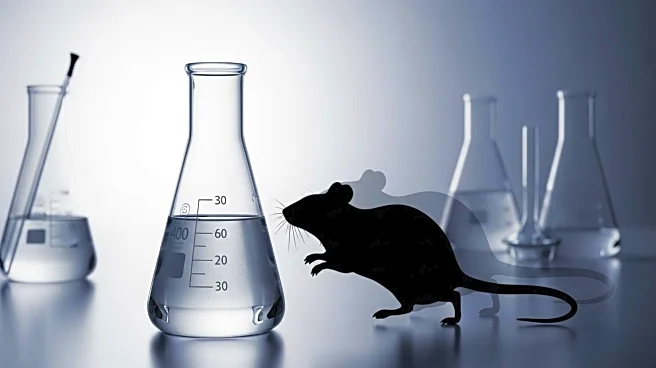What is the story about?
What's Happening?
A recent study has explored the impact of D-Galactose (D-Gal) on aging in rodent models, focusing on inflammatory and morphological changes in the colon. The research involved administering D-Gal at elevated concentrations to induce aging, which accumulates intracellularly as galactitol, leading to oxidative stress, mitochondrial dysfunction, and apoptosis. These processes are recognized as hallmarks of aging. The study observed significant epithelial and smooth muscle damage in the colon of D-Gal treated rats, along with increased cellular infiltration, indicating an ongoing aging process. Histological analyses revealed structural damage and functional impairments, such as faster transit and reduced stool output. The study also noted increased expression of aging marker proteins like p16Ink4a and lamin B1, which are associated with cellular aging and structural instability.
Why It's Important?
The findings of this study are significant as they provide insights into the biological mechanisms of aging, particularly in relation to oxidative stress and inflammation. Understanding these processes can contribute to the development of interventions aimed at mitigating age-related diseases and improving healthspan. The research highlights the role of D-Gal in accelerating aging, which could have implications for studying age-related conditions in humans. By identifying key markers and pathways involved in aging, scientists can better target therapies to slow down or reverse the effects of aging, potentially benefiting public health and reducing healthcare costs associated with age-related diseases.
What's Next?
Further research is needed to explore the molecular mechanisms by which D-Gal induces aging, particularly the upregulation of p16Ink4a and lamin B1. Investigating these pathways could lead to new therapeutic strategies for managing aging and its associated conditions. Additionally, studies could focus on comparing the effects of D-Gal-induced aging with natural aging processes to better understand the differences and similarities. This could help refine animal models used in aging research and improve the accuracy of findings applicable to human health.
Beyond the Headlines
The study raises ethical considerations regarding the use of animal models in aging research, emphasizing the need for humane treatment and consideration of alternative methods. It also highlights the complexity of aging as a biological phenomenon, involving multiple organ systems and molecular changes. The concept of 'inflammaging,' characterized by chronic low-grade inflammation, is particularly relevant, as it underscores the interconnectedness of inflammation and aging. These insights could influence future research directions and public policy related to aging and healthcare.
















